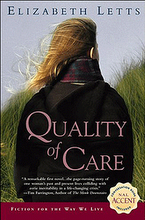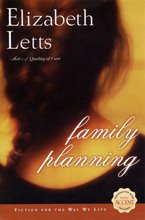I'm so sad to learn of Tillie Olsen's passing. I was lucky enough to hear her speak once when I was in college. She was an older woman then. She must have been in her seventies already, back then, in the early eighties.
She was small, and soft-spoken, but vibrant. She wore big glasses that were almost as big as her face. I had to learn forward to hear her.
At the time, it seemed that the whole world was available to me. I was twenty, and enrolled in an Ivy League university that had only started admitting women ten years before I got there, but by the time I arrived, my class was fifty per cent women. Sure, there were signs that we weren't quite equal-- most of my professors were men, the secret societies, most of them, were still only for men, the women's sports facilities were not as good-- but those were things we could overlook. Our success was guaranteed by the sheer bulk of our presence.
But still, I listened attentively to Tillie. Her words made an impression on me. There was something dishearteningly familiar to me about a woman who might be a writer but who was engaged in ironing shirts. I knew that woman. I had grown up with her. She was my mother.
I had no intention of being my mother, but I hadn't ever stopped and given a lot of thought to who might iron those shirts in her absence.
Now that I am a woman and an author, it seems that I give a disproportionate amount of time, thought, and anguish to laundry.
The laundry in my home isn't just a household task, it is a geographical destination, with a name: Mt. Laundry. We get out rappelling ropes and we scale it from time to time. We take along GPS devices and Nalgene bottles and all sorts of modern contrivances, and yet, there it stands: inevitable, immutable, and smelly.
Sure we make dents in it. Sure, we extract clean socks, underwear and sports clothes from Mt. Laundry on a regular basis, like miners extracting raw ore.
But we never fully tame its wilderness of laundry baskets, socks without mates, and graying underclothing that should have been washed separately with bleach.
And I'll admit that there are times when I fantasize about another sort of life. A life in which laundry is sorted and washed and ironed and folded and put away with the inevitable rhythm of the seasons. A life in which my relationship with books is no more than a weekly trip to the library. A life in which I sacrifice art to life, books to laundry, ideas to household order.
But, I wasn't raised for that. I was raised to believe that I would not have to stand ironing and looking out the window, thinking about books that might have been written while listening to the children playing in the street below.
I was raised to believe that I could do what I wanted to do, reach for whatever I wanted to reach for.
And I have. And as far as the ironing is concerned, it's not that much of a problem, because fortunately wrinkles are more accepted and someone had the good sense to invent wash and wear.
But someone still has to do the laundry, and in my household, that someone is no one, or rather, that someone is a distracted mom who throws some in between chapters and a distracted Dad who throws some more in after work.
But in my mind, somebody makes a whole lot of money, and then, I spend part of my day ironing, just because I can.
Except, that I'm afraid I never would.
Wednesday, January 03, 2007
Saturday, December 30, 2006
Did anyone read the Nobel Prize address written by Oran Pamhuk in this week's [I]New Yorker[/I]?
It's an amazing piece of writing about what it means to be a writer. One of the things that struck me was when he talked about growing up in Istanbul how fortunate he was to have access to his father's library of 1500 volumes. It sounded so sophisticated, to have a library of 1500 volumes. I imagined a shaded room, filled with leather-bound volumes, all lined up, organized by subject matter, author, and century.
Then, I started thinking about how many books I have in my house-- I really couldn't say-- I know it's an awful lot. I'm guessing that it's more than 1500 volumes, although it's a pretty eclectic collection and at least half, if not more, are children's books. I don't have a full representation of all of the classics, and I have lots and lots of hardcover contemporary fiction.
I think Shirley Jackson, in LIFE AMONG THE SAVAGES describes my house best.
It begins: "Our house is old, noisy and full. When we moved in we had two children and about five thousand books. I expect that when we finally overflow and move out again we will have perhaps twenty children and easily half a million books. We also own assorted lamps and chairs and beds and rocking horses and lamps and doll dresses and ship models and paint brushes and literally thousands of socks...."
So, how many books in your house? Do you have a "library" in the sense that it represents some kind of organized collection of writers or works, or is it just a collection of whatever you happened to pick up lately? Do you keep old college textbooks? Do you get rid of books? If so, how do you decide what to keep and what to get rid of?
It's an amazing piece of writing about what it means to be a writer. One of the things that struck me was when he talked about growing up in Istanbul how fortunate he was to have access to his father's library of 1500 volumes. It sounded so sophisticated, to have a library of 1500 volumes. I imagined a shaded room, filled with leather-bound volumes, all lined up, organized by subject matter, author, and century.
Then, I started thinking about how many books I have in my house-- I really couldn't say-- I know it's an awful lot. I'm guessing that it's more than 1500 volumes, although it's a pretty eclectic collection and at least half, if not more, are children's books. I don't have a full representation of all of the classics, and I have lots and lots of hardcover contemporary fiction.
I think Shirley Jackson, in LIFE AMONG THE SAVAGES describes my house best.
It begins: "Our house is old, noisy and full. When we moved in we had two children and about five thousand books. I expect that when we finally overflow and move out again we will have perhaps twenty children and easily half a million books. We also own assorted lamps and chairs and beds and rocking horses and lamps and doll dresses and ship models and paint brushes and literally thousands of socks...."
So, how many books in your house? Do you have a "library" in the sense that it represents some kind of organized collection of writers or works, or is it just a collection of whatever you happened to pick up lately? Do you keep old college textbooks? Do you get rid of books? If so, how do you decide what to keep and what to get rid of?
Subscribe to:
Posts (Atom)








